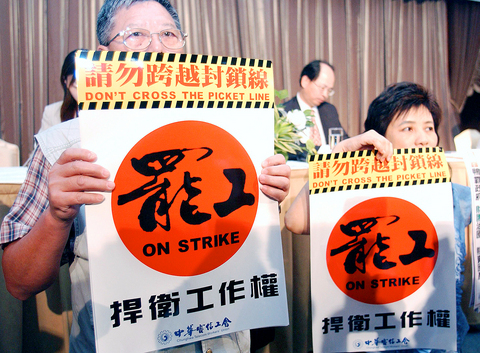In opposition to the government selling its shares in the state-controlled Chunghwa Telecom Co (
"We'll launch a long-term strike starting tomorrow [Tuesday] morning, which might last two or three days," Hung Hsiu-lung (洪秀龍), a core member of the Chunghwa Telecom Workers' Union (中華電信工會), said yesterday.
The union has been opposing the government's plan to privatize the telecommunications giant, worrying that their employee pension benefits will be sacrificed.

PHOTO: AFP
The Ministry of Transportation and Communications, the biggest shareholder in the company, plans to auction off a 3 percent stake to domestic investors today and another 14 percent stake through American Depositary Receipts (ADRs).
This will help reduce the ministry's stake in the company from the current 65 percent to around 48 percent, making Chunghwa Telecom a private entity.
The labor union said it was seeking an injunction from a US court against an additional 13.5 percent sale of the company's equity through ADRs.
"The contracted US attorneys-at-law is to file for an injunction by a US court tomorrow at the latest to freeze Chunghwa Telecom's ADR sale," which Chuang Ping-tang, secretary-general of the labor union, insisted is a violation of the law.
Although the labor union vowed to hold strikes on a larger scale than ever, company officials are unfazed and promised the public that services will continue as normal.
"We are confident that there will only be a small number of employees joining the strike or protesting in front of the company headquarters. Backup personnel will fill the vacant posts to offer services and protect consumers' rights," said company vice-president and spokesman Hank Wang (王漢朝).
Clashes between the union and management dominated and led to an abrupt halt of a meeting held yesterday in Taipei by the company to provide detailed information about the planned after-hours auction of its shares this afternoon.
Around ten union members held posters and signs voicing their opposition against the government's share sales in front of the podium while Wang was briefing scores of interested investors about the benefits of buying Chunghwa Telecom stocks.
"We oppose the heavy-handed manner with which the government wants to sell off national property cheaply, thereby enriching business conglomerates," read the posters, which were also distributed to members of the audience attending the meeting.
Despite the union's repeated efforts to stop the sales, Chunghwa Telecom chairman Hochen Tan (賀陳旦), president Lu Shyue-ching (呂學錦) and several high-level executives have already embarked on a road show in Hong Kong, Singapore, Japan and Europe to promote the company's ADR sales.
Meanwhile, Chunghwa Telecom vice-president Chang Feng-hsiung (
"I guarantee that Chunghwa Telecom will do whatever it can to prevent subscribers' rights from being compromised under any circumstances," he said.
Jonathan Liao (廖俊傑), an analyst with SinoPac Securities Corp (建華證券), said it is expected that the company can successfully be privatized this week, which will help pump nearly NT$100 billion (US$3.14 billion) into state coffers to help the government put a brake on its rising budget shortfall.
But because of the labor union's protest, the company's share price will lose momentum in the short term and do more harm than good, he said.
Chunghwa Telecom shares fell nearly three percent to close at NT$61.5 yesterday on the Taiwan Stock Exchange.

Macronix International Co (旺宏), the world’s biggest NOR flash memory supplier, yesterday said it would spend NT$22 billion (US$699.1 million) on capacity expansion this year to increase its production of mid-to-low-density memory chips as the world’s major memorychip suppliers are phasing out the market. The company said its planned capital expenditures are about 11 times higher than the NT$1.8 billion it spent on new facilities and equipment last year. A majority of this year’s outlay would be allocated to step up capacity of multi-level cell (MLC) NAND flash memory chips, which are used in embedded multimedia cards (eMMC), a managed

CULPRITS: Factors that affected the slip included falling global crude oil prices, wait-and-see consumer attitudes due to US tariffs and a different Lunar New Year holiday schedule Taiwan’s retail sales ended a nine-year growth streak last year, slipping 0.2 percent from a year earlier as uncertainty over US tariff policies affected demand for durable goods, data released on Friday by the Ministry of Economic Affairs showed. Last year’s retail sales totaled NT$4.84 trillion (US$153.27 billion), down about NT$9.5 billion, or 0.2 percent, from 2024. Despite the decline, the figure was still the second-highest annual sales total on record. Ministry statistics department deputy head Chen Yu-fang (陳玉芳) said sales of cars, motorcycles and related products, which accounted for 17.4 percent of total retail rales last year, fell NT$68.1 billion, or

In the wake of strong global demand for AI applications, Taiwan’s export-oriented economy accelerated with the composite index of economic indicators flashing the first “red” light in December for one year, indicating the economy is in booming mode, the National Development Council (NDC) said yesterday. Moreover, the index of leading indicators, which gauges the potential state of the economy over the next six months, also moved higher in December amid growing optimism over the outlook, the NDC said. In December, the index of economic indicators rose one point from a month earlier to 38, at the lower end of the “red” light.

MediaTek Inc (聯發科) shares yesterday notched their best two-day rally on record, as investors flock to the Taiwanese chip designer on excitement over its tie-up with Google. The Taipei-listed stock jumped 8.59 percent, capping a two-session surge of 19 percent and closing at a fresh all-time high of NT$1,770. That extended a two-month rally on growing awareness of MediaTek’s work on Google’s tensor processing units (TPUs), which are chips used in artificial intelligence (AI) applications. It also highlights how fund managers faced with single-stock limits on their holding of market titan Taiwan Semiconductor Manufacturing Co (TSMC, 台積電) are diversifying into other AI-related firms.